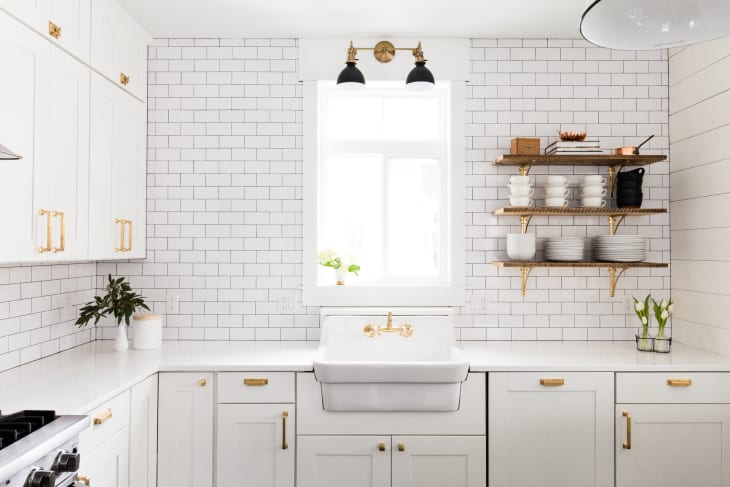10 Things Pro Cleaners Wish You Wouldn’t Do in the Kitchen

Your kitchen, in many ways, is like the heart of your home — it’s the space you store, prepare, and maybe even enjoy your food. For that same reason, your kitchen may also be one of the dirtiest, most cluttered rooms you have.
To make things smoother for everybody, here are 10 things professional cleaners wish you wouldn’t do in your kitchen.
1. Delay cleaning.
It’s true in every room: The longer you wait to clean, the more elbow grease you’ll need to do the job. Plus, in your kitchen, you run the risk of attracting pests and cross-contaminating bacteria. For that reason, Rebeca Medina, owner of Tidy Home Cleaning Services, recommends wiping down counters and appliances every time they’re used. “You don’t have to pull out your cleaning kit every time you cook, but you should keep a damp cloth and dry towel handy to wipe up spills and crumbs,” she says.
2. Let the dishes pile up.
Yes, more dishes equals more work (nobody likes scrubbing away hardened food from pots and pans). But there’s another reason not to let dirty dishes sit in your sink for too long, according to Medina: to prevent bacteria buildup, foul odors, and pests in your kitchen. Whenever possible, wash (or at least thoroughly rinse) your dishes right after using them.
3. Overload the dishwasher.
As long as we’re on the topic of dishes, be careful not to overload this important appliance. “It may be tempting to cram in all your dishes at once, but this can prevent proper cleaning and can even cause your dishwasher to work overtime and eventually lead to accelerated wear and tear,” says Karina Toner, operations manager at Spekless Cleaning. Instead, run multiple cycles (or hand-wash what you can’t fit).
4. Allow your stove and oven to get too dirty.
Your stove and oven are the workhorses of your kitchen, so it’s important to give them some TLC from time to time. Grease and food debris can quickly accumulate, making them tough to clean if left for too long. “Regular cleaning will not only keep them looking great, but it’ll also ensure that they’re working as efficiently as possible,” Toner says.
5. Let old food sit in the fridge.
Old and expired food can cause nasty odors and attract unwanted pests. So even though it’s a chore, Toner recommends regularly taking stock of your fridge and throwing out anything that’s expired or visibly inedible. While you’re at it, carve out a few minutes to wipe down the inside of the fridge, too.
6. Clean your floors first.
When you’re cleaning your kitchen, order matters — and it’s best to start with higher surfaces. “If you start by sweeping and mopping your floors, not only you are going to step on wet floors, but all the food crumbs and dust from upper surfaces will fall to the floor and you will lose all your work,” says Alex Varela, general manager of Dallas Maids.
7. Store more than you need.
Another one of Varela’s pet peeves is when people cram way too many plates and cups into their cupboards. “It’s not necessary, because you never use all of them, and the only thing they do is occupy space and create more dust and more utensils to clean,” he says. Try to regularly take inventory and only keep the utensils, plates, and cups you use.
8. Use the wrong cleaning products.
That all-purpose cleaner is convenient, but it’s not the best option for every surface in your kitchen. “Some surfaces require special solutions or cleaners to keep them shining like new,” says Justin Carpenter, owner of Modern Maids. For example, use a dedicated glass cleaner on windows, stainless steel cleaners on stainless appliances, and stone cleaner if you have granite or quartz counters. And always use a disinfectant rather than a cleaning spray if your goal is to stave off germs!

9. Use the same sponge or rag for everything.
Using the same scrubber for dishes, countertops, and appliances is a great way to spread bacteria, says Rocky Vuong, founder of Calibre Cleaning. Instead, designate separate sponges or cloths for different tasks and replace them frequently.
10. Store cleaning supplies haphazardly.
Disorganized cleaning supplies make already not-so-fun chores even harder (which may mean you’ll be less motivated to do them). Vuong recommends keeping all your cleaners organized and easily accessible to encourage regular cleaning. “Store them in a designated area, like a cabinet or under the sink, and consider using a caddy to keep everything together,” he says.






